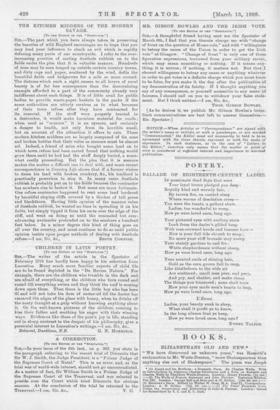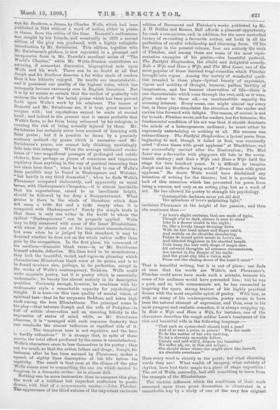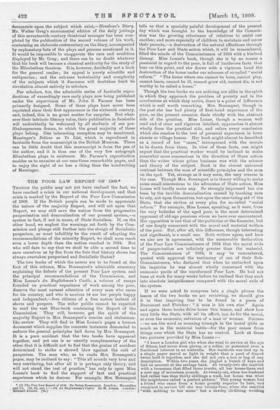BOOKS.
ELIZABETHANS OLD AND NEW.* "WE have disoovered an unknown poem," was Rossetti's exclamation to Mr. Watts-Dunton, " more Shakespearean than anything else out of Shakespeare." The poem was Joseph
• (1) Joseph and his Brethren : a Dramatic Poem. By Charles Wells. With an Introduction by Algernon Charles Swinbnrno and a Note on Rossetti and Charles Wells by Theodore Wattsahinton. London : Henry Frowde. [Is. net] —(2) The Works of Francis Beaumont and John Fletcher. Variorum -Edition. Vol. III. London: George Bell and Sons and A. II. Bullet]. [les. ed. net.]—. (3) Henskure's Diary. Edited by Walter W. Greg, M.A. Part II., Commentary. London : A. H. Dutton. rlOs. 6cl. not.]-14) The Tudor Facsimile Text& Under the Supervision. and Editorship of Jehu S. Fanner. London : Issued for Subscribers by T. C. and E. C. Jack. and his Brethren, a drama by Charles Wells, which had been published in 1824 without a word of notice, either in praise or blame, from the critics of the time. Rossetti's enthusiasui Was caught by his friends, and eventually in 1876 a second edition of the play was produced, with a highly eulogistic introduction by Mr. Swinburne. This edition, together with Mr. Swinburne's preface, is now reprinted in a pleasant and inexpensive form in Mr. Frowde's excellent series of "The World's Classics," while Mr. Watts-Dimton contributes an amusing, if somewhat discursive, biographical note upon Wells and his work. There can be no doubt at all that Joseph and his Brethren deserves a far wider. circle of readers than it has hitherto enjoyed. Its merits are unmistakable ; and it possesses one quality of the highest value, which has unhappily become extremely rare in English literature. But • it is by no means so certain that the verdict of poeterity will endorse the whole of the lavish praise which has been poured forth upon Wells's work by his admirers. The names of Rossetti and Mr. Swinburne are, it is true, great names to conjure with ; but reputations cannot be made at second hand ; and indeed in the present case it seems probable that Wells's fame, BO far from being enhanced by his eulogists, is running the risk of being actually injured by them. Mr. Swinburne has certainly never been accused of damning with faint praise ; but it is possible to damn by a precisely contrary method—by praise which is excessive—and Mr. Swinburne's praise, one cannot help thinking, unwittingly falls into this category. When the average unbiassed reader hears of "two magnificent passages of prolonged and subtle rhetoric, finer perhaps as pieces of conscious and imperious sophistry than anything in the way of poetical reasoning that has since been done"; when be is told that to one of Wells's lines parallels may be found in Shakespeare and Webster, "but hardly in any third dramatist " ; when he finds Wells's Phraxanor compared elaborately, and apparently on equal terms, with Shakespeare's Cleopatra,—it is almost inevitable that his expectations, raised to an inordinate height, should be followed by too deep a disappointment. What genius is there in the whole of literature which does not seem a trifle flat and a trifle empty when it is compared with Shakespeare's P Surely the simple truth is that there is only one writer in the world to whom the epithet " Shakespearean " can be properly applied. Wells may be fitly measured with some of the lesser Elizabethans,
with whom be shares one or two important characteristics ; but even when he is judged by this standard, it may be doubted whether he does not on the whole rather suffer than gain by the comparison. In the first place, his command of his medium—dramatic blank verse—is, as Mr. Swinburne himself admits, defective. His lines tend to be monotonous ; they lack the beautiful, varied, and vigorous phrasing which characterises Elizabethan blank verse at its prime, and is to be found nowhere else, perhaps, in its perfection, except in the works of Wells's contemporary, Beddoes. Wells could write exquisite poetry, but it is poetry which is essentially undramatic ; its beauty lies almost entirely in its descriptive qualities. Curiously enough, however, he combines with his undramatic style a remarkable capacity for psychological insight. It is here—in this rare quality of mental vision, of spiritual tact—that he far surpasses Beddoes, and takes high rank among the true Elizabethans. The principal scene in his play—that between Joseph and the wife of Potiphar—is full of subtle observation and an unerring felicity in the expression of states of mind, while, as Mr. Swinburne observes, it is "managed with such supreme dexterity that one overlooks the almost ludicrous or repellent side of it.
The temptress here is not repulsive, and the hero is hardly ridiculous." It is strange that, in spite of these merits, the total effect produced by the scene is unsatisfactory. Wells's characters seem to lose themselves in his poetry ; they say too much, so that the action falters and drags ; Joseph, for instance, after he has been accused by Phraxanor, makes a speech of eighty lines descriptive of his life before his captivity. The result is that even at the climax of the play Wells comes near to committing the one sin which cannot be forgiven in a dramatic writer : he is almost dull.
Nothing can be more instructive than to compare this play, the work of a brilliant but imperfect craftsman in poetic drama, with that of a consummate master,—john Pletcher. The appearance of the third volume of the important variorum
edition of Beaumont and Fleteher's works published by Mr. A. H. Bullen and Messrs. Bell affords a pleasant opportunity for such a comparison, and, in addition, for the mere unstudied luxury of re-reading a favourite author, set forth in all the perfection of careful scholarship and charming form. Of the five plays in the present volume, four are entirely the work of Pletcher, and among these are some of the most repre- sentative examples of his genius,—the beautiful pastoral, The Faithful Shepherdess, the ribald and delightful comedy, Bale a Wife and Have a Wife, and The Mad Lover, one of the most popular of those heroical tragi-comedies which Fletcher brought into vogue. Among the variety of wonderful quali- ties revealed in these plays—lyrical beauty of expression, vigour and nobility of thought, humour, pathos, fertility of imagination, and the keenest observation of life—there is one characteristic which runs through the rest, and, as it were, gives colour to them all,—an inexhaustible capacity for arousing interest. Every scene, one might almost say every line, in these plays stimulates the attention of the reader and carries him forward with delight. The reason, of course, is not far to seek; Fletcher wrote, not for readers, but for listeners; the fundamental condition of his art was that it should dominate the minds of a heterogeneous audience ; he must either be supremely entertaining or nothing at all. His success was extraordinary. The Faithful Shepherdess, a lyrical poem from beginning to end, though it failed at first, was eventually acted "divers times with great applause" at Blackfriars, and was successfully revived after the Restoration ; The Mad Lover was a favourite with playgoers till late in the seven- teenth century; and Rule a Wife and Have a Wife held the stage for two hundred years. It is difficult to imagine Joseph and his Brethren being acted "divers times with great applause." No doubt Wells would have disclaimed any intention of writing for the theatre; but it is precisely the lack of this intention which has prevented his poem from being a success, not only as an acting play, but as a work of art. He has allowed his poetry to strangle his psychology. ,
"Contemptible darkness never yet did dull The splendour of love's palpitating light," exclaims Phraxanor at the height of her passion; and then she continues thus :—
"At love's slight curtains, that are made of sighs, Though e'er so dark, silence is seen to stand Like to a flower closed in the night ; Or, like a lovely image drooping down
With its fair head aslant and finger rais'd,
And mutely on its shoulder slumbering. Pulses do sound quick music in Love's ear, And blended fragrance in his startled breath Doth hang the hair with drops of magic dew.
All outward thoughts, all common circumstance, Are buried in the dimple of his smile :
And the great city like a vision sails
From out the closing doors of the hrusli'd mind."
That is beautiful writing, but it is out of place ; one feels at once that the words are Wells's, not Phraxanor's. Fletcher could never have made such a mistake, because his sense of his audience would have prevented him ; but he was a poet, and so, with consummate art, he has succeeded in inspiring the spare, strong texture of his highly practical drama with the most exquisite spirit of poetry. With him, as with so many of his contemporaries, poetry seems to have been the natural element of expression, and thus, even in his most pungent and realistic comedies, it is always cropping up. In Rule a Wife and Have a Wife, for instance, one of the characters describes the rough soldier Leon's treatment of his rich and beautiful wife in the following language :—
"That such an oyster-shell should hold a pearl And of so rare a price, in prison! Was she made To be the matter of her own undoing, To let a slovenly unwieldy fellow, Unruly and self-will'd, dispose her beauties P We suffer all, sir, in this sad eclipse ; She should shine where she might show like herself, An absolute sweetness." • Here every word is strictly to the point; but what charming words they are! What wealth of imagery, what subtlety of rhythm, have lent their magic to a piece of stage exposition ! The art of Wells, assuredly, had still something to learn from the example of the Elizabethans.
The curious influence which the conditions of their work exercised upon these great dramatists is illustrated in a remarkable way by a study of one of the very few original documents upon the subject which exist,—Henstotei 's Diary. Mr. Walter 'Greg's monumental edition of the daily jottings of this seventeenth-century theatrical manager has been corn-. pieta by the publication of the second volume of his work, containing an elaborate conlmentary on the diary, accompanied by explanatory lists of the plays and persons mentioned in it. It would be impossible to exaggerate the care and erudition displayed by Mr. Greg ; and there can he no doubt whatever that his book will become a classical authority for the study of the Elizabethan theatres. It is, however, decidedly not a book for the general reader ; its appeal is purely scientific and antiquarian; and the extreme technicality and complexity of the subjects which it discusses will doubtless limit its circulation almost entirely to scholars.
For scholars, too, the admirable series of facsimile repro- ductions of exceedingly rare early plays now being published under the supervision of Mr. John S. Farmer has been primarily designed. Some of these plays have never been reprinted since their first appearance in the sixteenth century, and, indeed, this is no great matter for surprise. But what- ever their intrinsic literary value, their publication in facsimile will undoubtedly be welcomed by all students of our pre- Shakespearean drama, to which the great majority of these plays belong. One interesting exception may be mentioned, Massinger's Believe as Ye List, which is reproduced in facsimile from the manuscript in the British Museum. There can be little doubt that this manuscript is from the pen of the author, and it is thus one of the very few autograph Elizabethan plays in existence. Mr. Farmer's reproduction enables us to examine at our ease these remarkable pages, and to enjoy the sight of no less a thing than the handwriting of Messinger.








































 Previous page
Previous page